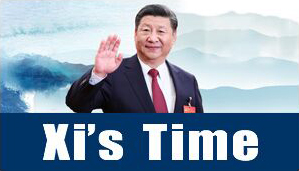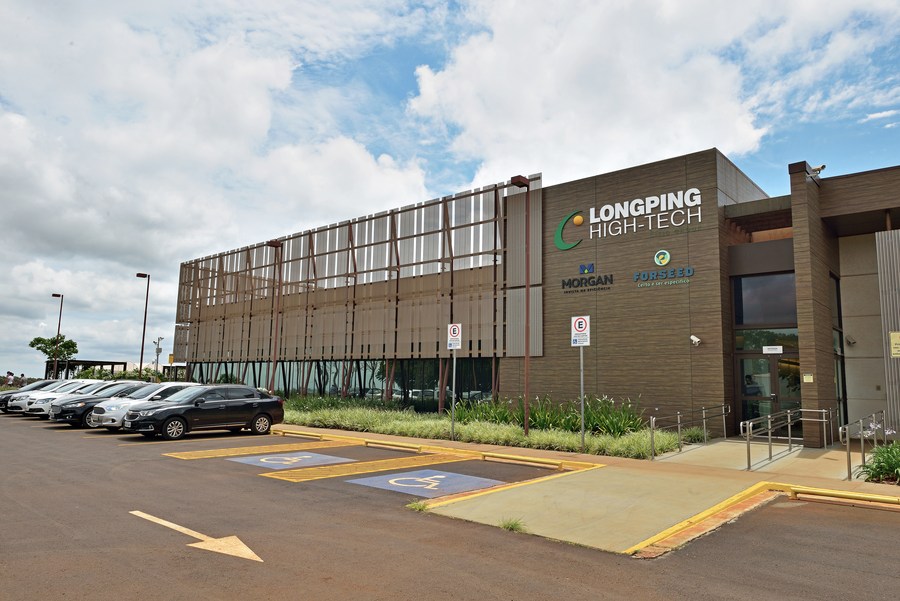
Photo taken on Jan. 18, 2021 shows Longping High-Tech Brazil, a Chinese-invested company owned by Longping Agriculture Science Co., Ltd., in Cravinhos, Brazil. (Xinhua)
BEIJING, June 25 (Xinhua) -- Traversed by the lower Amazon River flowing into the Atlantic Ocean, the state of Para has one of the busiest port in Brazil and a wealth of mineral and agricultural resources. However, for decades, local people have been struggling to harness the natural abundance to their well-being.
Lack of funds on large projects such as roads and transmission lines delayed the state's integration with markets in the country's rich south. And local residents have limited access to smaller infrastructure that more directly helps them to earn money.
Aline Feitosa, a mother of four who runs a small bar in Brasil Novo in Para state, is upset about muddy roads in the city. "People didn't come to my bar because of the mud in the rainy season and the dust in the drought season."
Among the country's 26 states, Para is the fifth poorest in terms of GDP per capita due in part to a chronic shortage of infrastructure. But things are changing for the better.
PEOPLE-CENTERED COOPERATION
In 2018 and 2021, the New Development Bank (NDB) granted loans of over 200 million U.S. dollars to build roads, bridges as well as sanitation and communication facilities in Para.
In the city of Brasil Novo, local authorities managed to pave some 17 km of roads with the NDB funds and construction is expected to finish by August. The renovated roads and a well-designed drainage system will not only renew the community but also improve health condition of the residents as dust in summer used to flow into every single household and cause many to suffer from serious respiratory diseases.
Promoting the welfare of the people has always been a major area of the BRICS cooperation over the past 16 years. Since its inception in 2015, the NDB has become an essential part of the BRICS mechanism tasked with promoting joint development with a people-centered philosophy.
The bank has approved more than 80 projects regarding transportation, energy and other types of infrastructure with a total portfolio of some 30 billion dollars to improve people's well-being.
"We should respond to people's concerns, pursue the larger interests of all countries, and steer global development to a new era to deliver benefit to all," Chinese President Xi Jinping said in his keynote speech at the opening ceremony of the BRICS Business Forum delivered on Wednesday.
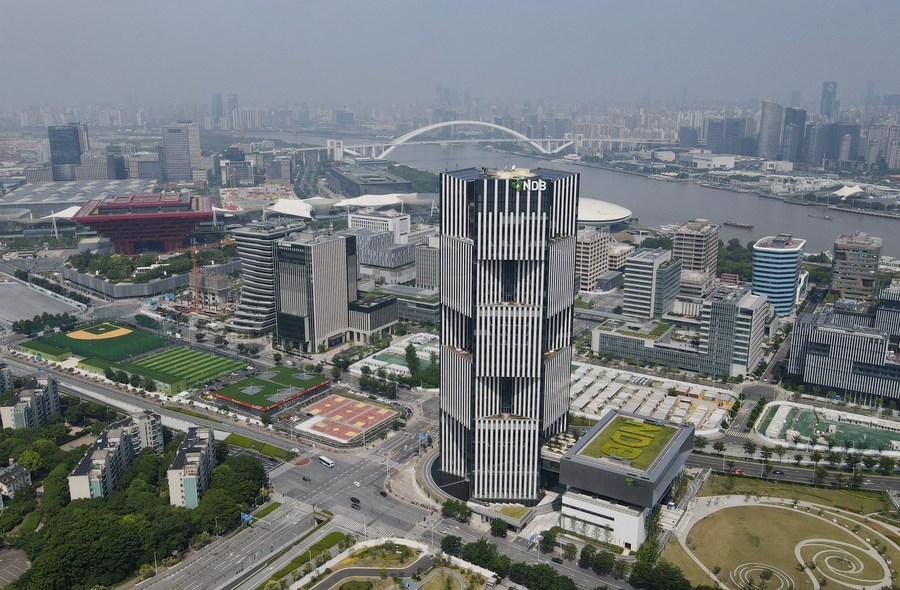
Aerial photo taken on June 17, 2022 shows the headquarters building of the New Development Bank (NDB), also known as the BRICS bank, in east China's Shanghai. (Xinhua/Fang Zhe)
His appeal for a people-centered approach resonates with the group's aspirations for shared growth and with his economic philosophy, known as "Xiconomics," which has guided China's own development and promoted its global cooperation programs.
Running a convenience store by an already paved road in Brasil Novo city, 38-year-old Giziany Fernandes Pereira has been enjoying public benefits brought by the project.
"It's much more comfortable now as you don't get your feet dirty as soon as you leave the house. Sales increased at my store because of easier accessibility. It is a wonderful program," she said.
The NDB loans have played a significant role in poverty reduction in the state, said Ruy Cabral, secretary of urban development and public construction of Para. "The NDB has been a spectacular partner for the facilities that it has provided us to date, and we hope to extend this partnership further."
HIGH-QUALITY PARTNERSHIP
"Standing at the crossroads of history, we should both look back at the journey we have traveled and keep in mind why we established BRICS in the first place, and look forward to a shared future of a more comprehensive, close, practical and inclusive high-quality partnership so as to jointly embark on a new journey of BRICS cooperation," Xi said in his speech at this year's BRICS summit on Thursday.
Twenty-one years ago, when British economist Jim O'Neill coined the term "BRIC" -- an acronym for Brazil, Russia, India and China, it read like investment advice, pointing to promising prospects for emerging economies.
With South Africa added in 2010 to become the "BRICS," the group, representing a quarter of the global GDP, 18 percent of global trade and 25 percent of the world's foreign investment, has become a vital platform for strengthening cooperation among the five countries and a vital force for improving global governance.
Trade cooperation among the BRICS countries has seen remarkable progress over the years. In 2021, the total volume of trade in goods of BRICS countries reached nearly 8.55 trillion dollars, up by 33.4 percent year on year, official data shows. Meanwhile, China's trade with other BRICS countries totaled 490.42 billion dollars, a yearly jump of 39.2 percent which outpaces the overall growth of China's foreign trade over the same period.
In April, a string of online sales campaigns themed "Buy BRICS" was held in the southeast Chinese coastal city of Xiamen. In a two-week shopping spree, Chinese consumers bought 270 million yuan (40 million dollars) worth of products from the other four BRICS countries, according to statistics provided by e-commerce platforms.
In 2017, when China hosted the 9th BRICS Summit and other events in Xiamen, Xi suggested that BRICS partners bear in mind their long-term goals rather than narrowly look at growth rates, advance structural reforms and explore new growth drivers and paths to achieve "better quality, more resilient and sustainable growth."
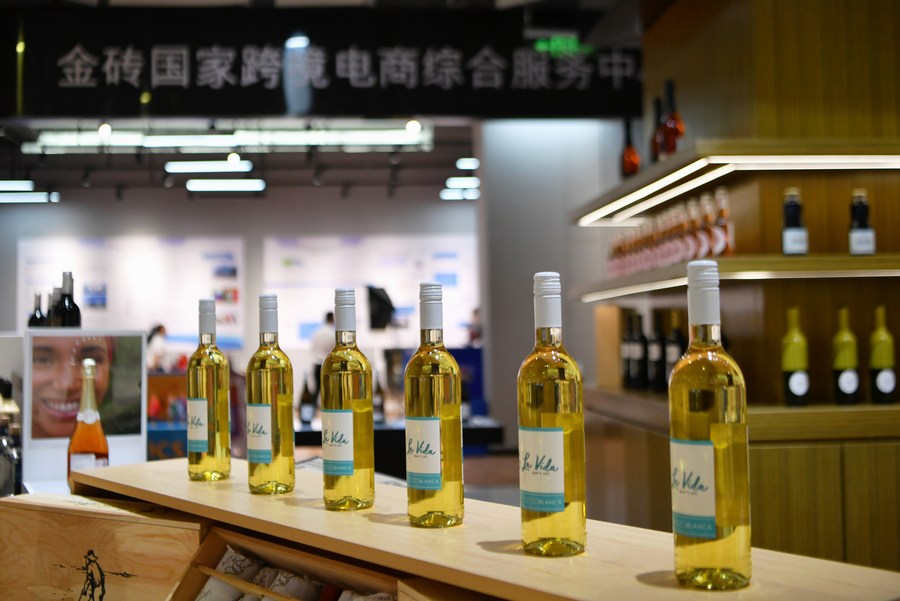
Products are displayed at the commodity service center for products of the BRICS countries in Xiamen City, southeast China's Fujian Province, June 23, 2022. (Xinhua/Wei Peiquan)
His suggestion has proven to be significant to the expansion of BRICS cooperation into more areas. Cooperation in the digital economy has brought tangible benefits to the populations of the BRICS countries, with further digital transformation across various industries expected in the future.
Committed to developing an industrial internet and digital manufacturing, the five countries seek to build an industrial cooperation network to promote the circulation of capital, goods, talent and technology by facilitating an open and inclusive trade and investment environment.
The BRICS members have ample human resources and great economic potential and occupy a pivotal position in the global industrial chain, said Rosalia Varfalovskaya, a leading researcher at the Russian Academy of Sciences.
Amid a complicated international environment, the BRICS cooperation mechanism will play an important role in dealing with external challenges and propelling global economic growth, she said.
BRICS PLUS FOR SUSTAINABLE DEVELOPMENT
As part of this year's BRICS agenda, the group inaugurated a vaccine research and development center online in March. The five countries vowed to make vaccines accessible and affordable for developing countries as global public goods.
The immunization gap is one of the concerns shared by BRICS countries. To solve such global challenges, the group agreed to promote the expansion of global governance into more developing nations, a move West-dominated organizations are reluctant to take.
Besides vaccines, China and other BRICS countries have been providing other "public goods," such as development experience and technology, particularly to the Global South, to bolster sustainable development.
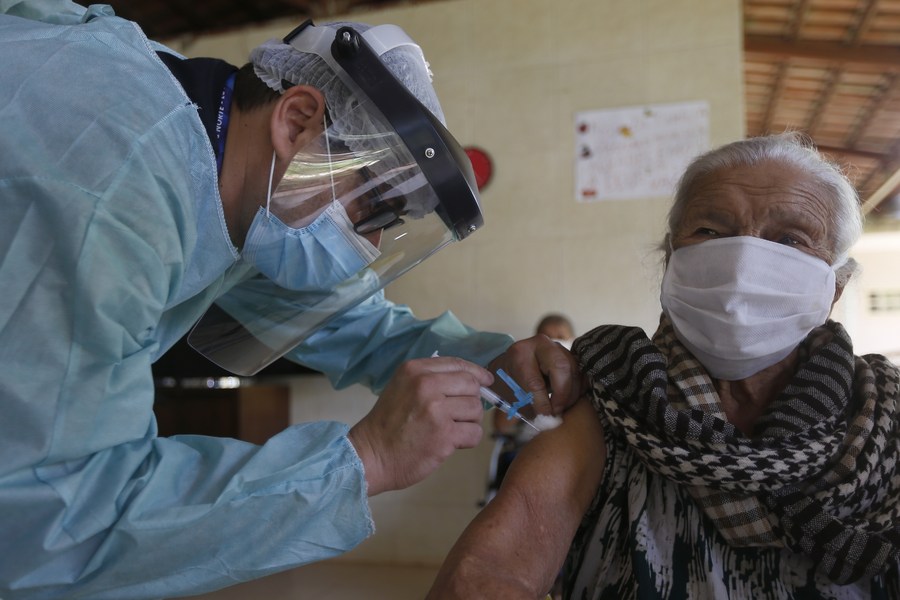
An elderly person receives a dose of China's COVID-19 vaccine in Brasilia, Brazil, Jan. 22, 2021. (Photo by Lucio Tavora/Xinhua)
For example, China is helping many African countries, such as Mozambique, to develop modern agriculture with the help of the China-developed BeiDou Navigation Satellite System and unmanned equipment.
In 2017, China steered its involvement of other nations into what has become known as "BRICS Plus" by building a more comprehensive partnership with other developing countries and organizations to turn BRICS into a more influential platform for South-South cooperation.
Gu Qingyang, an associate professor at the Lee Kuan Yew School of Public Policy of the National University of Singapore, said BRICS cooperation has made remarkable progress in green development, science and technology, the digital economy and infrastructure construction.
Expanding BRICS cooperation will be more conducive to rallying developing countries to tackle global challenges, Gu said.
Last year, Xi launched the Global Development Initiative (GDI), calling on all countries to forge a united, equal, balanced and inclusive global development partnership.
For the Chinese leader, development holds the key to solving various difficult problems facing the world.
In his speech delivered at the 14th BRICS Summit on Thursday, Xi underlined the implementation of the UN's 2030 Agenda for Sustainable Development and the building of a global community of development. He pledged to work with BRICS partners to add more substance to the GDI and contribute to more robust, greener and healthier global growth.
Inclusiveness highlighted in China-proposed initiatives is what the world needs, Gu said, adding that China and other BRICS countries share a broadly similar world view with other developing countries that believe in inclusive development, multilateralism and mutual benefit.
Elaborating on global cooperation for common development, South African Ambassador to China Siyabonga Cyprian Cwele said, "in order to sustain peace, there must be development."
"What struck me was the message from President Xi Jinping that we should rise to the challenge as leaders, and be able to work together to deal with all these emerging challenges," Cwele said.
Xi's remarks remind us of "love for our people that they should grow, develop and live a prosperous life," Cwele added. ■




